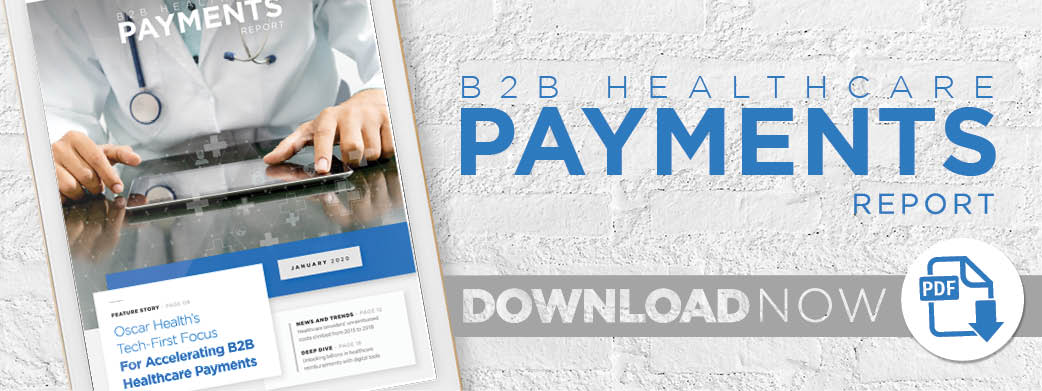Oscar Health: Using Tech To Take The Pain Out Of B2B Healthcare Payments

Healthcare providers must frequently wait to get paid by insurance company partners for the patient treatments they have already administered. Some private practice physicians even report weeks or months going by before they see insurance reimbursements. These delays can cause major challenges for providers’ cash flows, as practitioners must continue to handle their own expenses even when revenue is slow to arrive.
However, digital tools and new approaches can help healthcare providers take charge of the problem, and improve their chances of smoother business-to-business (B2B) reimbursements. The “B2B Healthcare Payments Report,” a PYMNTS and American Express collaboration, examines key reimbursement pain points, and explores how accounts receivable software, claims submission pre-review tools and other supports can speed the pace of B2B healthcare compensation.![]()
Around The B2B Healthcare Payments World
Many healthcare providers are hesitant to implement modern accounts receivable solutions, despite the benefits. Healthcare companies with legacy accounts receivable systems often fear that modernizing software will interrupt their ability to access and manage existing accounts. Content services and systems integration provider Flatirons Digital Innovations is aiming to put these fears to rest, however, via a new solution designed to pull legacy system data into a central, modernized revenue cycle management system.
Hospitals’ struggles with legacy accounts receivable systems also recently drew attention from B2B financing company Crestmark. The firm launched a new division focused on providing financing to help smooth providers’ cash flows during periods in which they are waiting for insurance reimbursements to arrive.
Efforts to streamline the reimbursement process also target an early stage of the process: claims submissions. Healthcare solutions company Sentry Data Systems recently announced an offering intended to help medical facilities review their claims for errors before sending them to insurers. The solution aims to catch any problems that, if uncorrected, could reduce the likelihood of insurers approving claims the first time around — thus, sparing providers the time and expense of revising rejected claims, and refiling them.
![]() To find out more about these and the rest of the latest headlines, download the Tracker.
To find out more about these and the rest of the latest headlines, download the Tracker.
Oscar Health’s Technology-First Focus For Accelerating B2B Healthcare Payments
Insurance companies that want to retain their healthcare provider partners, and recruit more clients, must minimize reimbursement frictions. Speeding up that process means finding ways to more quickly assess claims, then disburse rapid electronic payments.
In this month’s feature story, Brett Lotito, vice president of insurance operations at health insurance company Oscar Health, explained how digital portals and automation systems can cure pains afflicting B2B healthcare payments. Check out the feature story in the Tracker.
Deep Dive: Unlocking Billions In Healthcare Reimbursements With Digital Tools![]()
Insurers are not the only ones with the power to improve B2B healthcare reimbursement processes. Healthcare providers must do their best to ensure that their claims are approved on first submission. Rejected claims force healthcare providers to pass the costs to patients, suffer budget hits or fight to get the insurers to change their minds and reverse the rejections.
This month’s Deep Dive examines how digital tools can help providers improve the chances of their claims being approved to keep compensation flowing. Get the scoop in the Tracker.
About The Tracker
The B2B Healthcare Payments Report, a collaboration between PYMNTS and American Express, highlights ongoing efforts to modernize healthcare providers’ claims submission strategies and insurers’ B2B reimbursement practices, and deploy new innovations and solutions to improve B2B cash flow in the medical sector.
